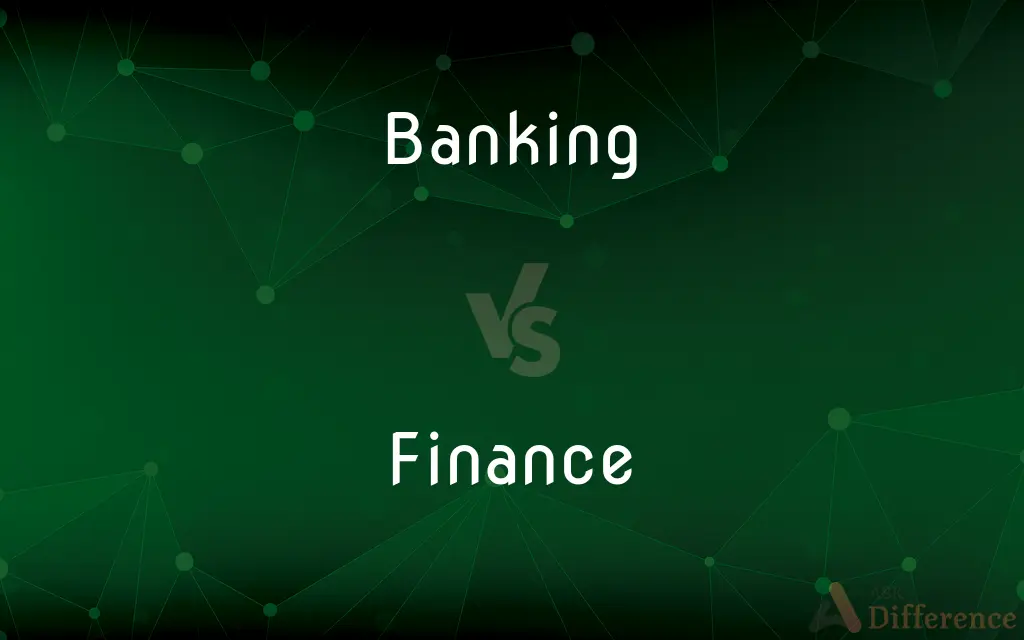Banking vs. Finance — What's the Difference?
By Urooj Arif & Fiza Rafique — Updated on March 15, 2024
Banking refers to the business of managing money held in banks, including transactions like deposits and loans. Finance, however, encompasses the broader system of managing money, investments, and assets across various sectors.

Difference Between Banking and Finance
Table of Contents
ADVERTISEMENT
Key Differences
Banking is a subset of finance, focusing specifically on the activities and services provided by banks and financial institutions related to depositing money, making loans, and managing accounts. Finance, on the other hand, is a wider field that includes banking but also extends to investment management, financial planning, and analysis, covering both the public and private sectors. It involves the allocation of assets and liabilities over time under conditions of certainty and uncertainty.
While banking is primarily concerned with the management of deposits and loans within a regulatory framework to ensure financial stability and protect depositors, finance explores broader themes such as the creation, management, and study of money, banking, credit, investments, assets, and liabilities. Finance theories also inform the strategies behind investment decisions, risk management, and financial forecasting.
Banking institutions play a crucial role within the financial system by facilitating transactions, providing liquidity to the economy, and offering financial products to meet the needs of individuals and businesses. Meanwhile, the finance sector analyzes market trends, guides investment strategies, and assesses risks to optimize financial performance and economic growth.
Professionals in banking often specialize in areas such as retail banking, commercial banking, or investment banking, focusing on services like loan origination, capital raising, and financial advisory. In contrast, finance professionals might work in a variety of roles across different industries, including corporate finance, investment management, financial planning, and consulting, requiring a broad understanding of market forces, investment strategies, and economic principles.
Comparison Chart
Definition
The business of offering deposit and loan services.
The management of money, assets, and investments.
ADVERTISEMENT
Scope
Narrower, focused on banking institutions.
Broader, covering various sectors and disciplines.
Main Focus
Deposits, loans, and account management.
Allocation of assets, investment, and risk management.
Regulation
Highly regulated to protect depositors.
Regulated, but varies across different areas of finance.
Professional Roles
Retail, commercial, and investment banking.
Corporate finance, investment management, financial planning.
Compare with Definitions
Banking
The business conducted by a bank.
Banking involves accepting deposits and lending money.
Finance
The management of large sums of money, especially by governments or large companies.
Finance is critical to the company's growth strategy.
Banking
The activities related to managing money in banks.
Online banking has revolutionized how we manage our finances.
Finance
Activities related to banking, leverage or debt, credit, capital markets, money, and investments.
His expertise in finance has helped navigate the company through economic downturns.
Banking
The provision of loans, credit, and savings accounts.
Banking products have become more diverse and accessible.
Finance
The science or study of the management of funds.
She holds a degree in finance.
Banking
Services aimed at facilitating financial transactions.
Mobile banking services are on the rise, offering greater convenience.
Finance
The planning, directing, monitoring, organizing, and controlling of the monetary resources of an organization.
Effective finance management is essential for the organization's success.
Banking
The sector encompassing institutions that provide financial services.
He has worked in banking for over a decade.
Finance
The process of raising funds or capital for any kind of expenditure.
Finance options for the new project include loans and investments.
Banking
The business of a bank.
Finance
Finance is a term for matters regarding the management, creation, and study of money and investments. Specifically, it deals with the questions of how an individual, company or government acquires money – called capital in the context of a business – and how they spend or invest that money.
Banking
The occupation of a banker.
Finance
The management of money, banking, investments, and credit.
Banking
The business of managing a bank.
Finance
Finances Monetary resources
Could not make the purchase because of limited finances.
Banking
The occupation of managing or working in a bank.
Finance
The supplying of funds or capital.
Banking
(finance) Investment banking.
She became an analyst in banking after graduation, choosing that career path over sales and trading.
Finance
To provide or raise the funds or capital for
Financed a new car.
Banking
(aviation) A horizontal turn.
Finance
To supply funds to
Financing a daughter through law school.
Banking
A mechanical component to prevent vibration in a timepiece, etc.
Finance
The management of money and other assets.
Banking
(rail) The practice of assisting a train up a steep incline (called a bank) with another locomotive at the rear.
Finance
The science of management of money and other assets.
Banking
Present participle of bank
Finance
Monetary resources, especially those of a public entity or a company.
Who's really in charge of a democracy's finances?
Banking
The business of a bank or of a banker.
Finance
The provision of a loan, payment instalment terms, or similar arrangement, to enable a customer to purchase an item without paying the full amount straight away.
Finance on all our new cars is provided by ABC Loans Ltd.
Banking
Engaging in the business of banking; maintaining savings and checking accounts and issuing loans and credit etc.
Finance
(intransitive) To conduct, or procure money for, financial operations; manage finances.
Banking
Transacting business with a bank; depositing or withdrawing funds or requesting a loan etc.
Finance
To pay ransom.
Finance
(transitive) To manage financially; be financier for; provide or obtain funding for a transaction or undertaking.
His parents financed his college education.
He financed his home purchase through a local credit union.
Finance
To extort ransom from.
Finance
The income of a ruler or of a state; revenue; public money; sometimes, the income of an individual; often used in the plural for funds; available money; resources.
All the finances or revenues of the imperial crown.
Finance
The science of raising and expending the public revenue.
Finance
To conduct the finances of; to provide for, and manage, the capital for; to financier.
Securing foreign capital to finance multitudinous undertakings.
Finance
The commercial activity of providing funds and capital
Finance
The branch of economics that studies the management of money and other assets
Finance
The management of money and credit and banking and investments
Finance
Obtain or provide money for;
Can we finance the addition to our home?
Finance
Sell or provide on credit
Common Curiosities
What are some careers in banking?
Careers in banking include roles like bank teller, loan officer, branch manager, and investment banker.
Can banking exist without finance?
No, banking is a subset of finance and cannot exist independently of the broader financial system.
What skills are important in banking and finance?
Key skills include analytical thinking, customer service, risk management, and an understanding of regulatory environments.
What is the main difference between banking and finance?
Banking specifically refers to the services and activities of banks, while finance is a broader term encompassing the management of money, assets, and investments across various sectors.
What are some careers in finance?
Finance careers range from financial analysts and planners to investment managers and corporate finance officers.
How does regulation affect banking and finance?
Banking is heavily regulated to protect depositors and maintain financial stability, while regulation in finance varies by sector, focusing on transparency, risk management, and investor protection.
What role do banks play in the financial system?
Banks provide the infrastructure for financial transactions, credit, and liquidity in the economy, acting as intermediaries between savers and borrowers.
How has technology influenced banking and finance?
Technology has revolutionized both fields, introducing online banking, mobile payment solutions, and financial technologies that enhance efficiency and accessibility.
How do investments relate to finance?
Investments are a key component of finance, concerning the allocation of assets to generate returns and build wealth over time.
How do banking and finance impact individuals?
Banking provides individuals with essential services like savings and loans, while finance impacts personal wealth management and investment opportunities.
Why is finance important to the economy?
Finance is crucial for allocating resources efficiently, supporting economic growth, and facilitating trade and investment.
What is the relationship between risk management and finance?
Risk management is a core aspect of finance, aiming to identify, assess, and prioritize risks to minimize, monitor, and control the impact of unfortunate events.
Can finance help in solving environmental issues?
Yes, finance plays a crucial role in addressing environmental challenges through sustainable investing, green bonds, and financing projects that support environmental conservation.
What is financial literacy, and why is it important?
Financial literacy is the understanding of various financial skills, including personal financial management, budgeting, and investing. It is crucial for making informed financial decisions and achieving financial stability.
What educational background is required for a career in finance?
Careers in finance typically require a degree in finance, economics, accounting, or a related field, with advanced positions often requiring further certification or a graduate degree.
Share Your Discovery

Previous Comparison
Townhouse vs. Duplex
Next Comparison
Syntax vs. GrammarAuthor Spotlight
Written by
Urooj ArifUrooj is a skilled content writer at Ask Difference, known for her exceptional ability to simplify complex topics into engaging and informative content. With a passion for research and a flair for clear, concise writing, she consistently delivers articles that resonate with our diverse audience.
Co-written by
Fiza RafiqueFiza Rafique is a skilled content writer at AskDifference.com, where she meticulously refines and enhances written pieces. Drawing from her vast editorial expertise, Fiza ensures clarity, accuracy, and precision in every article. Passionate about language, she continually seeks to elevate the quality of content for readers worldwide.















































